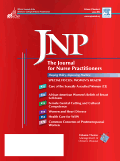
JNP- The Journal for Nurse Practitioners
Scope & Guideline
Fostering Professional Growth in Advanced Nursing.
Introduction
Aims and Scopes
- Clinical Practice Improvement:
JNP emphasizes research and articles that focus on improving clinical practices among nurse practitioners. This includes innovative approaches, evidence-based guidelines, and quality improvement initiatives. - Healthcare Policy and Advocacy:
The journal addresses the role of nurse practitioners in healthcare policy and advocacy, highlighting their impact on legislation, workforce issues, and access to care. - Interprofessional Collaboration:
There is a consistent focus on articles that promote interprofessional education and collaboration, showcasing the importance of teamwork across healthcare disciplines for optimal patient care. - Emerging Health Trends and Technologies:
JNP explores the integration of emerging technologies and trends in healthcare, such as telehealth, artificial intelligence, and digital health tools, reflecting the evolving landscape of nursing practice. - Culturally Competent Care:
The journal promotes culturally competent care practices, emphasizing the need for sensitivity to diverse populations and addressing health disparities within various communities.
Trending and Emerging
- Telehealth and Remote Care Models:
The rise of telehealth as a primary mode of service delivery has prompted numerous articles focusing on best practices, technology integration, and the effectiveness of remote care in various settings. - Mental Health Integration in Primary Care:
There is an increasing trend towards integrating mental health care within primary care settings, addressing the critical need for holistic approaches to patient care. - Addressing Health Disparities:
Emerging themes focus on strategies to reduce health disparities among marginalized populations, emphasizing the role of nurse practitioners in advocating for equitable care. - Substance Use and Addiction Treatment:
With the ongoing opioid crisis and increasing recognition of substance use disorders, articles focusing on treatment strategies, harm reduction, and recovery support are gaining prominence. - Technology in Nursing Education:
The incorporation of technology in nursing education, including simulation-based learning and online training modules, is a growing area of focus, reflecting the need to prepare practitioners for modern healthcare environments.
Declining or Waning
- Traditional Clinical Skills Focus:
There appears to be a waning emphasis on basic clinical skills training articles, as the journal shifts towards more complex and integrated care models that address broader health issues and technologies. - Narrow Specialty Topics:
Topics that are highly specialized and narrow in scope, such as specific disease management without broader implications or integrated care perspectives, have become less prevalent. - Historical Perspectives:
Articles that focus on historical perspectives or traditional practices in nursing may be receiving less attention, as the journal prioritizes contemporary issues and future-oriented practices. - Single-Country Studies:
Research focusing solely on practices or issues within a single country seems to be declining, as there is a growing interest in global health perspectives and cross-cultural studies. - Basic Theoretical Frameworks:
There is a noticeable decrease in articles that discuss fundamental theoretical frameworks without practical application, indicating a preference for research that directly impacts practice.
Similar Journals
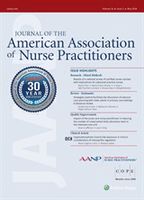
Journal of the American Association of Nurse Practitioners
Driving Change in Healthcare Through Scholarly ExcellenceJournal of the American Association of Nurse Practitioners is a leading publication dedicated to the advancement of nurse practitioner research, education, and practice. Published by Lippincott Williams & Wilkins, this journal focuses on disseminating innovative findings, clinical approaches, and evidence-based practices that enhance patient care and the profession's stature. With an ISSN of 2327-6886 and an E-ISSN of 2327-6924, the journal has established a significant presence within the academic community, boasting a 2023 Q2 ranking in Nursing and a Q3 in the broader category of Medicine (miscellaneous). Its indexed position—ranked #70 out of 139 in General Nursing by Scopus—reflects its commitment to quality and relevance in the field. Open access options further ensure that research findings are readily available to practitioners, educators, and students, facilitating a greater impact on patient outcomes and nursing practices. With content spanning from 2013 to 2024, the journal continues to serve as a pivotal resource for those endeavoring to enhance the expertise of nurse practitioners worldwide.
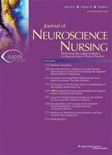
JOURNAL OF NEUROSCIENCE NURSING
Transforming Knowledge into Compassionate CareJournal of Neuroscience Nursing, published by Lippincott Williams & Wilkins, stands as a pivotal resource within the interdisciplinary field of neuroscience and nursing. With an ISSN of 0888-0395 and E-ISSN of 1945-2810, this journal has been dedicated to advancing knowledge and practice in neuroscience nursing since its inception in 1986. It aims to provide a platform for the dissemination of significant research, clinical guidelines, and innovative care strategies that shape the future of nursing in the neurological domain. The journal is recognized in various categories, achieving a Q1 ranking in Medical and Surgical Nursing and a Q3 ranking in Neurology (Clinical) as of 2023, highlighting its influence and relevance in the medical community. Although it does not operate on an open-access model, the journal's commitment to quality is evidenced by its strong Scopus rankings, including a notable rank of #3 out of 26 in Nursing - Medical and Surgical Nursing, reflecting its vital role in fostering scholarly discourse. Located in Philadelphia, PA, the Journal of Neuroscience Nursing is an essential publication for researchers, practitioners, and students dedicated to improving patient outcomes and advancing the field of neuroscience nursing.
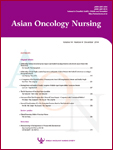
Asian Oncology Nursing
Empowering Oncology Nurses for a Healthier TomorrowAsian Oncology Nursing is a pivotal journal dedicated to advancing the field of oncology nursing across the Asian continent and beyond. Published by the esteemed Korean Oncology Nursing Society, this journal serves as a platform for researchers, clinicians, and educators to disseminate groundbreaking findings and innovative practices in cancer care and nursing. With an ISSN of 2287-2434 and E-ISSN 2093-7776, it is committed to enhancing the knowledge and skills of oncology nursing professionals, thereby improving patient outcomes. Although currently not operating as an open-access platform, the journal emphasizes the significance of bridging the research gap in oncology nursing, fostering collaboration among professionals in the field. Given the increasing importance of culturally competent care in oncology, Asian Oncology Nursing positions itself as an essential resource for those who strive to elevate standards of care and educate future generations of oncology nurses.
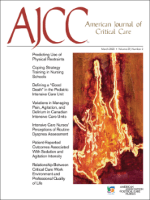
AMERICAN JOURNAL OF CRITICAL CARE
Transforming patient outcomes through dedicated scholarship.Welcome to the American Journal of Critical Care, a premier publication dedicated to advancing the field of critical care nursing and enriching the understanding of critical care practices. Established in 1992 and published by the American Association of Critical Care Nurses, this journal serves as a vital resource for researchers, practitioners, and students alike, providing cutting-edge research, insightful reviews, and evidence-based practices that shape modern critical care. With an impressive impact factor and distinguished rankings—ranking in Q1 for Critical Care Nursing and Q2 for miscellaneous Medicine in 2023—this journal underscores its significance in the healthcare landscape. Although it does not currently offer Open Access, the American Journal of Critical Care remains committed to disseminating high-quality knowledge that drives innovation and improves patient care in critical settings. Join us as we explore the latest advancements and pivotal studies that influence patient outcomes and shape the future of nursing practice.
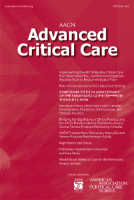
AACN Advanced Critical Care
Empowering healthcare professionals through innovative research.AACN Advanced Critical Care, published by the American Association of Critical-Care Nurses, serves as an essential resource in the field of critical care nursing and emergency medicine. With an ISSN of 1559-7768 and an E-ISSN of 1559-7776, this peer-reviewed journal is committed to advancing the knowledge and practice of critical care through rigorous research and innovative clinical insights. The journal holds a reputable position within its field, achieving a Q2 ranking in Critical Care Nursing and Emergency Medicine, alongside a Q3 ranking in miscellaneous Medicine categories for 2023. With a convergence of scholarly contributions from 2006 to 2024, it strives to explore the latest advancements and challenges in critical care environments, ensuring that its readership of researchers, healthcare professionals, and students are well-informed of emerging trends and best practices. The journal does not offer Open Access, however, its impact and relevance are evident from its Scopus rankings, which place it at a commendable #14 in Critical Care Nursing and #47 in Emergency Medicine. As a crucial platform for knowledge dissemination, AACN Advanced Critical Care plays a vital role in enhancing clinical effectiveness and improving patient outcomes in acutely ill populations.
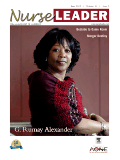
Nurse Leader
Championing Research for Effective Nurse LeadershipNurse Leader is a prestigious journal published by ELSEVIER SCIENCE INC, dedicated to the dynamic field of nursing leadership and management. With an ISSN of 1541-4612 and an E-ISSN of 1541-4620, this journal has been a vital resource since its inception in 2003, covering emerging topics and innovative practices that shape the future of healthcare leadership. As a Q3 category journal in the 2023 rankings, it holds a ranked position of #24 out of 40 in the Scopus Nursing Leadership and Management category, highlighting its significance in the academic community with a 41st percentile standing. Although not an open access journal, Nurse Leader provides valuable insights and research findings that equip researchers, professionals, and students with the knowledge and tools necessary for effective leadership in nursing. With a commitment to advancing the profession, the journal remains a crucial platform for sharing impactful research and fostering collaboration among practitioners in the United States and beyond.
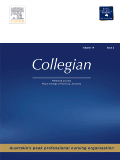
Collegian
Pioneering Research for a Dynamic Nursing Profession.Collegian is a distinguished academic journal published by Elsevier, focusing on the dynamic field of nursing. Launched in 1994 and continuing through to 2024, it aims to contribute to the advancement of nursing knowledge and practice. With an ISSN of 1322-7696 and an E-ISSN of 1876-7575, this journal has achieved an impressive standing, securing a Q2 category ranking within Nursing (miscellaneous) and positioning itself at #49/139 in the general nursing category on Scopus, with a commendable 65th percentile. The journal provides a platform for both established researchers and emerging scholars to share innovative research, case studies, and reviews that shape nursing education and practice. Although not open access, it remains widely recognized for its rigorous peer-review process and substantial contributions to nursing literature. As the profession evolves, Collegian stands out as a pivotal resource for professionals, educators, and students who seek to enhance their understanding and application of nursing science.
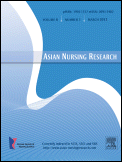
Asian Nursing Research
Driving excellence in nursing through accessible research.Asian Nursing Research is a prestigious open access journal published by ELSEVIER SCIENCE INC, located in South Korea. Since its inception in 2007, this journal has served as an essential platform for disseminating high-quality research in the field of nursing and healthcare, boasting a notable impact factor and categorized within the top quartiles of both Q1 in Nursing (miscellaneous) and Q2 in Medicine (miscellaneous) for 2023. It holds a commendable rank of #27 out of 139 in the general nursing category, placing it in the 80th percentile according to Scopus rankings. The journal's comprehensive scope encompasses a wide range of topics relevant to nursing practice and research, thereby addressing pressing healthcare challenges and promoting evidence-based clinical practices. By offering open access since 2007, Asian Nursing Research ensures that researchers, professionals, and students have unrestricted access to valuable insights and advancements in the nursing discipline, making it a critical resource for advancing knowledge and improving patient care across Asia and beyond.
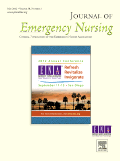
Journal of Emergency Nursing
Advancing Emergency Care Through Research and InnovationJournal of Emergency Nursing, published by Elsevier Science Inc, serves as a premier platform for advancing the field of emergency nursing. Since its inception in 1975, this peer-reviewed journal has established itself as a vital resource for researchers, practitioners, and educators alike, with a notable impact factor and current ranking of #8 out of 32 in the Emergency Nursing category, placing it in the 76th percentile. The journal's commitment to the dissemination of high-quality evidence, innovative practices, and essential insights makes it an indispensable tool for those seeking to excel in acute care settings. Although not open access, the Journal of Emergency Nursing is dedicated to fostering knowledge and improving patient outcomes through robust research and comprehensive reviews, aligning closely with its mission to enhance emergency nursing practices and education through every issue until 2024 and beyond. For professionals and students keen on staying at the forefront of emergency care advancements, this journal provides a wealth of knowledge and resources, reflecting the critical issues and developments shaping the future of healthcare.
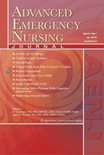
Advanced Emergency Nursing Journal
Exploring New Frontiers in Emergency MedicineAdvanced Emergency Nursing Journal, published by Lippincott Williams & Wilkins, stands as a key resource within the domains of Emergency Medicine and Emergency Nursing. With a commitment to advancing the field, this journal provides a platform for rigorous research, critical reviews, and innovative practices aimed at enhancing patient care in emergency settings. Though it holds a Q3 ranking in both related categories as per the 2023 metrics, its global reach spans various aspects of emergency care, promising insights that are crucial for both professionals and academics alike. Covering topics from clinical procedures to policy analysis, the journal invites submissions that aim to bridge theory and practice, highlighting the importance of evidence-based approaches in emergency nursing. Researchers, educators, and healthcare practitioners can Find more information and explore their own contributions in a dynamic environment that continuously evolves with the field. Whether you're seeking to stay current with the latest advancements or to publish your findings, this journal is an essential asset for those dedicated to improving care in urgent medical situations.